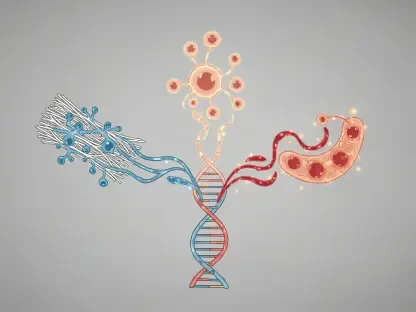In a surprising move, Rentschler Biopharma announced its decision to withdraw from the cell and gene therapy (CGT) business at its Stevenage, UK facility, marking a significant shift in the company’s strategic focus. This decision comes despite recent investments in building advanced capabilities for CGT development, including the installation of a lentiviral vector manufacturing toolbox. CEO Benedikt von Braunmühl indicated that the strategic review pointed toward biologics as the more promising segment, prompting the pivot away from CGT.
The Difficulties Facing Cell and Gene Therapy
Post-Pandemic Challenges
The cell and gene therapy (CGT) sector has encountered numerous hurdles following the COVID-19 pandemic, impacting various players in the field. The rapid pivot towards vaccine development during the pandemic left a mark on the industry, with companies struggling to regain their footing and momentum. Rentschler Biopharma, along with others like Lonza and WuXi Apptec, experienced challenges in sustaining growth and meeting market expectations. Despite Lonza’s recent positive financial results, WuXi Apptec’s decision to sell its cell therapy unit underscores the sector’s volatility and the specific difficulties these companies face in securing stable ground.
The uncertainties surrounding legislative developments, such as the stalled BIOSECURE Act, further complicate the landscape for companies like WuXi Apptec that rely on US government funding. The potential restrictions from such legislation have introduced additional layers of complexity and financial instability. These external pressures, combined with the overall sluggish growth in the CGT market, have created a challenging environment for companies to navigate and plan their long-term strategies effectively.
Market Performance and Analytical Deficiencies
In addition to external legislative challenges, the cell and gene therapy market’s performance has been hampered by inadequate analytical tools and methodologies. During Biotech Week Boston in 2024, industry experts like Renee Hart from LumaCyte underscored the critical role that robust analytics play in CGT development. Many of the failures and setbacks in CGT are attributed to insufficient analytics, which hinder the ability to validate and optimize therapies effectively. This deficiency has resulted in slowed market growth and compromised the potential success of CGT products.
The lack of adequate analytical methods not only affects current developments but also imposes significant barriers to entry for new market participants. Companies are often unable to refine their products or scale manufacturing processes efficiently, leading to increased costs and prolonged development timelines. These issues highlight the need for advancements in analytical technologies to support the burgeoning field of CGT and ensure more consistent and predictable outcomes. Without substantial improvements in this area, the CGT market may continue to face obstacles in realizing its full potential.
Rentschler Biopharma’s Strategic Shift
Focus on Biologics
Rentschler Biopharma’s decision to exit the CGT market aligns with its strategic emphasis on biologics, a segment experiencing greater demand and showing more stable growth prospects. CEO Benedikt von Braunmühl emphasized that the strategic review revealed the need to concentrate on areas where the company has established expertise and can deliver significant value. The pivot towards biologics is seen as a path to leverage existing capabilities and infrastructure, thus reinforcing Rentschler’s position in the competitive biotech landscape.
The focus on biologics is a logical progression, given the company’s track record and the consistent demand for these products. Biologics, with their broad application in treatments for various diseases, offer a promising avenue for sustainable growth. This strategic refocus allows Rentschler to allocate resources more effectively and concentrate efforts on innovations within the biologics sphere, which remains a dynamic and evolving field.
Supporting Transition for Affected Employees
Alongside the strategic shift, Rentschler Biopharma has committed to supporting employees affected by the closure of the Stevenage CGT facility. CEO Benedikt von Braunmühl praised the dedication and hard work of the Stevenage team, acknowledging their contributions to the company’s endeavors in cell and gene therapy. The company has pledged to provide assistance and facilitate transitions for impacted staff members, ensuring they have access to resources and opportunities during this change.
This support underscores Rentschler’s commitment to its workforce, even amid significant organizational changes. By focusing on employee well-being and career transitions, the company aims to maintain morale and foster goodwill, which is crucial for sustaining its reputation and operational continuity. This approach not only reflects corporate social responsibility but also highlights the importance of human capital in the biotech industry, where skilled professionals play a pivotal role in driving innovation and achieving company goals.
Industry Implications and Future Directions
Broader Impact on the CGT Sector
Rentschler Biopharma’s exit from the CGT market signals a broader trend of reevaluation and realignment within the industry. As companies grapple with the complexities and challenges of post-pandemic recovery, strategic adaptations are essential for sustained growth and competitiveness. This shift indicates an ongoing reassessment of market priorities, with many firms likely to scrutinize their positions in the CGT sector and explore other promising avenues like biologics.
The broader impact includes potential consolidation within the CGT space as companies with established expertise and resources might acquire struggling entities to bolster their own capabilities. Additionally, the industry might see increased investment in new analytical technologies, as the need for robust and reliable methods continues to be a critical factor for success. These trends highlight the dynamic and evolving nature of the biotech landscape, where adaptability and strategic foresight are key to navigating emerging opportunities and challenges.
Future Prospects and Innovations
In a surprising turn of events, Rentschler Biopharma has announced its decision to exit the cell and gene therapy (CGT) sector at its Stevenage, UK facility. This move signifies a notable shift in the company’s strategic direction. Despite making recent investments to enhance its CGT capabilities, such as installing a sophisticated lentiviral vector manufacturing toolbox, Rentschler Biopharma has decided to redirect its focus. CEO Benedikt von Braunmühl explained that a comprehensive strategic review revealed greater potential in the biologics segment, making it a more attractive area for the company’s future development. This pivot away from CGT reflects the dynamic nature of the biotech industry and underscores the importance of adaptability in business strategies. The decision underscores Rentschler Biopharma’s commitment to aligning its resources with the most promising and impactful areas of therapeutic development, ensuring they remain competitive and innovative in an ever-evolving market.









